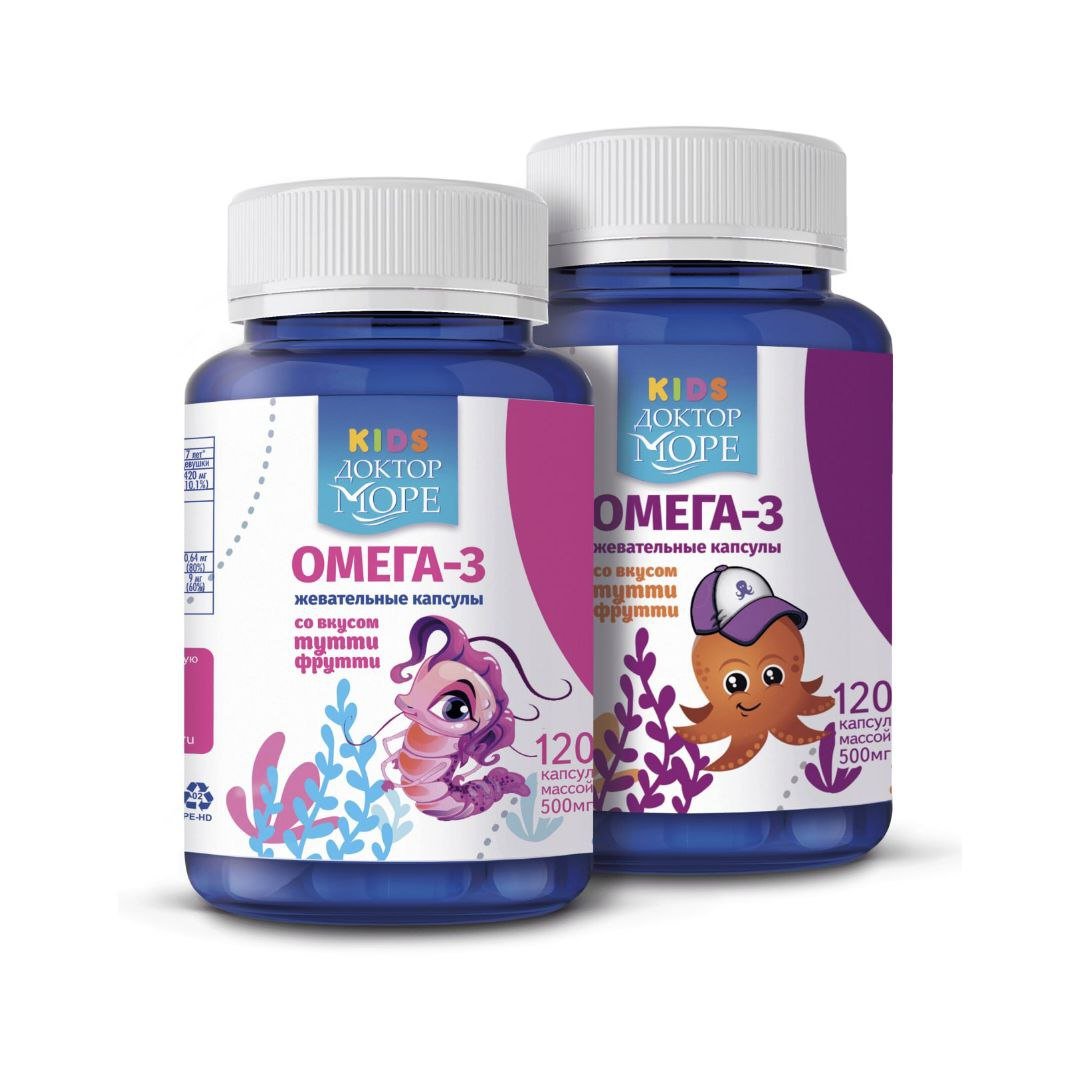Description
Why choose our Omega-3?
- Dr. More is a recognized expert and undisputed leader in the development of products based on marine ingredients. We are proud of our knowledge of the sea and the ability to translate it into working and efficient products!
- Our Omega-3’s are delicious . Everyone’s favorite taste of tutti-frutti and the absence of a fishy aftertaste will make even the most picky eater fall in love with vitamins.
- Our Omega-3 is balanced . Enriched with vitamins A, E and D3, it is specially formulated to meet the key “vitamin” needs of the growing body.
- Our Omega-3 is pure . We use exclusively pure raw materials that have passed multi-stage control for the presence of heavy metals and toxins.
And our Omega-3:
- Improves memory, attention and concentration
- Reduces manifestations of hyperactivity and attention deficit disorder
- Strengthens the nervous system and contributes to the normal development of cognitive functions
- Participates in strengthening bones and teeth due to the content of vitamin D3
- Strengthens the immune system and reduces the frequency of influenza and SARS
- Increases the production of tear fluid, relieving dry eye syndrome
- Vitamins A and E reduce the manifestations of dermatitis and improve the general condition of the skin
Omega 3
Omega-3 from wild breeds of salmon fish is optimally suited for the child’s body and contains the necessary proportions of polyunsaturated fatty acids (PUFAs) – eicosapentaenoic and docosahexaenoic – for the development of the body.
The value of wild fish is that it feeds on algae, and not feed on fish farms. It is algae that, under the influence of the gastric juice of fish, are converted into omega-3 naturally. And this omega-3 is the most balanced and does not require additional chemical processing.
Polyunsaturated fatty acids are present in all organs and systems. The human body does not synthesize PUFAs on its own, but they are vital for brain development, strengthening cell membranes, maintaining metabolism and the correct functioning of the cardiovascular system, especially during a period of intensive growth.
Omega-3 plays a special role in the formation of the nervous system of the child. Often, sleep problems, hyperactivity syndrome, decreased concentration or inattention are associated precisely with a lack of omega-3, which the child receives less from the daily diet.
Regular intake of omega-3s is also recommended for:
- Improvement of intestinal motility and absorption of minerals
- Regulation of phosphorus and calcium levels
- Protection against “bad” cholesterol in an unbalanced diet
- Maintaining lipid balance in the skin in the presence of dermatological problems, as well as in the cold season
Vitamin E
It has a pronounced antioxidant effect. Serves to protect against free radicals and is involved in improving the barrier functions of the skin.
In the cold season, children often experience so-called “rear”, and their hands become rough, microcracks appear.
Last but not least, this is due to the lack of vitamin E in the body, which is involved in regeneration processes and helps protect the skin from external aggressive factors.
Vitamin E intake is necessary for:
- Soft skin without redness and damage
- Seasonal prevention of beriberi
- Strengthening the immune and nervous systems
- Speeding up the healing of skin lesions
Vitamin A
Vitamin A is also called retinol or carotene. It is recommended to be taken together with vitamin E to enhance each other’s effects. The synergistic effect is maximally manifested in their effect on the skin, so these two vitamins are indispensable for dermatitis, dryness and irritation on the skin.
Along with vitamin E and omega-3, vitamin A is involved in strengthening blood vessels and cell membranes. It also plays a critical role in supporting visual function during periods of intense growth.
Its deficiency in childhood can lead to a violation of color perception or hemeralopia – a deterioration in vision in a dark room. Vitamin A is necessary for children who spend a lot of time at the computer or phone. Radiation from gadgets provokes the drying of the cells of the cornea and leads to the so-called “dry eye” symptom.
Vitamin A intake is necessary for:
- Prevention of bone fragility and fractures
- Peeling and rashes on the skin
- Retinal lesions
- Maintaining the integrity of cell membranes
Vitamin D 3
The benefits of vitamin D3 cannot be overestimated. During the pandemic, its properties were confirmed as one of the agents that can protect the body from the penetration of the virus and increase the body’s own protective functions.
In childhood, vitamin D3 plays a critical role in the prevention of rickets and normal bone development. In most cases, we are deficient in this vitamin due to climatic conditions, and it is quite difficult to get the necessary dosage from food.
Without vitamin D3, it is impossible to absorb calcium, which is an essential element for building bones and teeth.
Vitamin D 3 is also essential for:
- Prevention of osteoporosis and rickets
- Strengthening cellular and humoral immunity
- Maintaining the state of the nervous system
- Reducing anxiety, depression
- Speeding up recovery after illnesses
MAIN INGREDIENTS:
Ocean fish oil, vitamin A, vitamin E, vitamin D3
ADDITIONAL INFORMATION
Directions for use: Children aged 3 to 7 years: 3 capsules daily with meals; children from 7 to 11 years old: 4 capsules a day with meals; Children over 11 years old: 4 capsules daily with meals.
Duration of admission: 1 month. If necessary, the reception can be repeated. Repeated appointments are possible throughout the year.
| Ingredient composition: | ||||||||
| Active Ingredients | Soda in 1 capsule, mg | Arrives per day | ||||||
| Children 3 – 6 years old* | Children 7 – 10 years old* | Children 11 – 14 years old* | Children aged 15 – 17* | Adults
**/*** |
||||
| boys | girls | young men | girls | |||||
| OMEGA-3 | at least 105 | 315 mg
(17.5%) |
420 mg
(20%) |
420 mg
(16.8%) |
420 mg
(18.2%) |
420 mg
(8.7%) |
420 mg
(10.1%) |
420 mg
21%** |
| Averages | ||||||||
| Of them:
eicosapentaenoic acid docosahexaenoic acid |
54 36 |
in total 108% |
in total 144% |
216 mg (36%)** 144 mg (20.57%)** |
||||
| Vitamin A |
no more than 0.16
|
0.48 mg
(96%) |
0.64 mg
(91.4%) |
0.64 mg
(64%) |
0.64 mg
(80%) |
0.64 mg
(64%) |
0.64 mg
(80%) |
0.64 mg***
(80%) |
| Vitamin E |
not less than 2.25
|
6.75 mg
(96.4%) |
9 mg
(90%) |
9 mg
(75%) |
9 mg
(75%) |
9 mg
(60%) |
9 mg
(60%) |
9 mg***
(90%) |
| Vitamin D3 |
no more than 0.0033
|
10 mcg
(66.65%) |
13.32 mcg
(88.8%) |
13.32 mcg***
(266.4%) |
||||



Reviews
There are no reviews yet.